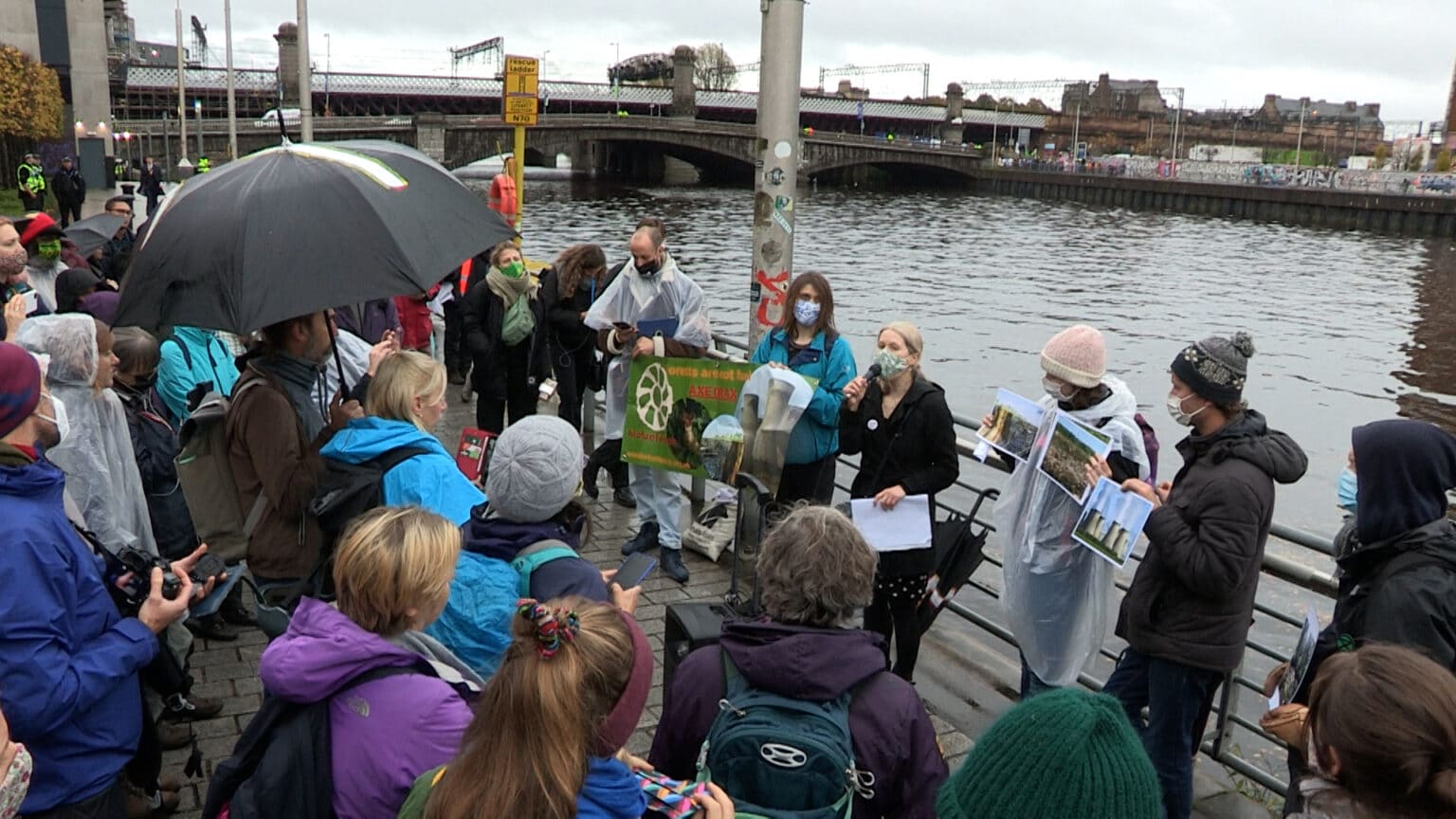GLASGOW, SCOTLAND — Scotland’s second city has rolled out the green carpet to world leaders and thousands of delegates arriving for climate talks.
The city and its leaders have been eager to present a green image of Glasgow over COP26, with advertisements and billboards across town promoting its climate-friendly projects and initiatives.
However, Glasgow remains home to major polluting companies, and historically played a significant role in triggering both industrialism and colonial expansion — with profound effects for people and the environment.
To get a better understanding of the city’s legacy, DeSmog tagged along to an activist-led tour organised by Brussels based advocacy group, Corporate Europe Observatory (CEO) and local activists at Glasgow Calls Out Polluters. Their goal was to expose Glasgow’s darker side as highlighted by important city landmarks, along with speakers including climate and racial justice activists and frontline communities from the global south discussing the current impacts of the city’s activities.
“We organised the tour as a way to shine a light on Glasgow’s colonial past, its polluting present and how the COP is being used by all in the city to greenwash their image,” Pascoe Sabido, a researcher and campaigner at CEO, told DeSmog.
“Glasgow’s wealth was built on colonialism and slavery,” he continued, “and it’s no coincidence that the city’s main corporations continue to plunder and exploit those in the global South, continuing that colonial legacy.”
George Square
The tour started in Glasgow’s main civic square, George Square, which is known for its impressive frontages and monuments to figures who are fêted for their contribution to Scottish history. This includes James Watt, an innovator whose work on steam train technology helped kick-start the industrial revolution. Other statues include Robert Peel, former Prime Minister and founder of London’s Metropolitan Police.
The Square is also home to the headquarters of Glasgow City Council, which through its pension fund invests an estimated £836 million in fossil fuel companies. Earlier this year the council announced its intention to divest from these companies, but several councillors have criticised the Council for its lack of progress on this pledge.
Gallery of Modern Art
A favourite with visitors to the city, Glasgow’s Gallery of Modern Art is one of the city’s proudest contemporary attractions. However, the gallery exposes the troubling provenance of Glasgow’s wealth. Based in Royal Exchange Square, it was created in 1778 as the townhouse of William Cunninghame, a Glasgow tobacco merchant who made his fortune through the triangular slave trade which saw Europeans trade manufactured goods for captured African people, who were shipped across the Atlantic Ocean to become slaves in the Americas.
SSE and Scottish Power
Scottish energy company SSE, which has its Glasgow office in the city centre, has worked to promote a green image of itself ahead of the climate summit, and is one of the official sponsors of COP26. But SSE is Scotland’s second largest emitter and its gas-fired power station in the Aberdeenshire town of Peterhead is Scotland’s single largest polluting site. A few roads away from SSE’s Glasgow office lies Scottish Power, whose parent company, the Spanish multinational Iberdrola, is currently developing four new gas plants in Mexico.
Teekay Shipping
Close to the North bank of the River Clyde are the Scotland offices of Teekay Shipping, one of the world’s largest ship-owning companies which specialises in oil and gas transportation. In recent years, the company has promoted innovations in “ice-breaking” technology which allow for transportation of these fossil fuels through the Arctic.
Barclays Bank
In the district of Tradeston, on the opposite bank of the River Clyde, lies the new Glasgow offices of Barclays Bank, the opening of which was celebrated by the Scottish government as part of its efforts to strengthen Scotland’s role as a financial hub.
Barclays is Europe’s largest funder of fossil fuels, and has channelled over £144 billion into supporting oil, coal, and gas projects since the Paris Agreement was signed, according to campaigners at BankTrack. This includes its involvement in a number of tar sands projects, including the Line 3 and TransMountain pipelines in North America, which have been the subject of protests from Indigenous communities.
‘We are taking the lead’
The tour’s speakers included climate and racial justice activists from the UK, Mexico, Guatemala, and Papua New Guinea as well as Graham Campbell, the first Afro-Caribbean councillor to be elected to Glasgow’s City Council.
While emphasising the destructive nature of environmentally damaging industries on communities, Indigenous speakers on the tour emphasised their communities’ role in providing a different blueprint. Speaking to attendees, Raki Ap, a spokesperson from the liberation group, Free West Papua, emphasised: “We are no victims, we are taking the lead.”
A speaker from the Indigenous group Futuros Indigenas told DeSmog: “We are here to talk about how fossil fuels and mining, even the solutions they say they are taking for climate change such as renewable energies, are having lots of consequences over our lands and over our lives. We are here to denounce the positions they take in the COP, they are just more of the same thing, it’s just greenwashing, because they don’t want to change the system.”
Marc Bramham, who took part in the tour, said he had travelled up with his partner from Cornwall to Glasgow, where he wanted to hear from those most impacted by climate change and learn more about the city’s past. An alternative view of Glasgow “hasn’t been adequately represented in the talks, it hasn’t been adequately represented outside of the talks and it hasn’t been adequately represented in the wider world,” he said.
“We’re never going to beat this unless we hear these people’s voices and hear what it’s like when you actually feel climate breakdown impacting you and your lives.”
Subscribe to our newsletter
Stay up to date with DeSmog news and alerts







